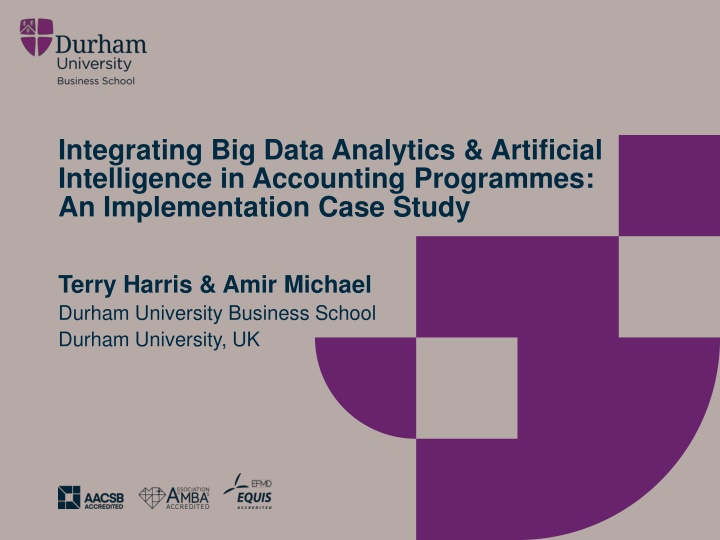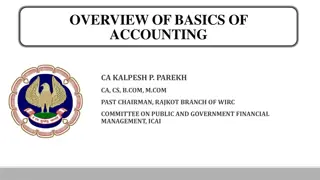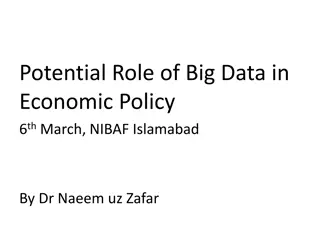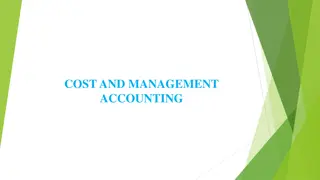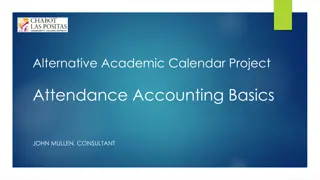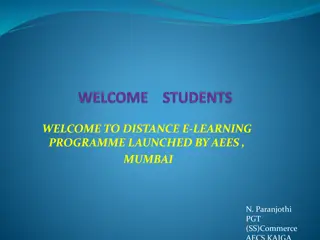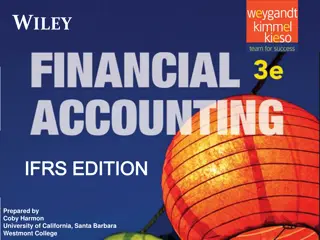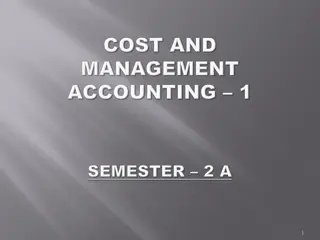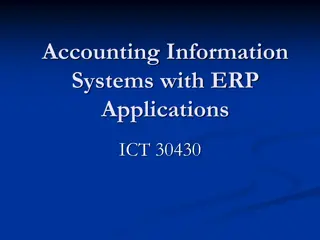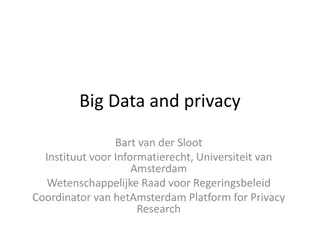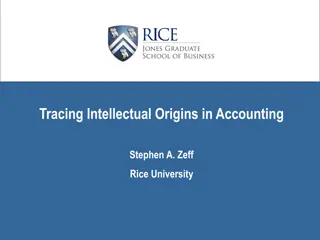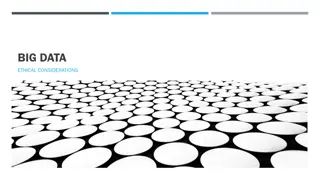Embracing Big Data Skills in Accounting Education: A Case Study
Big Data and Artificial Intelligence are transforming the field of accounting, necessitating significant changes in education to equip students with essential analytical and database skills. This implementation case study advocates for training students in higher-order thinking skills to effectively utilize Big Data and emphasizes the importance of asking good questions to extract meaningful insights. The evolving landscape of accounting education, as outlined by various directives, underscores the need for graduates to possess critical thinking abilities and be adept at applying quantitative methods to emerging technologies.
Download Presentation

Please find below an Image/Link to download the presentation.
The content on the website is provided AS IS for your information and personal use only. It may not be sold, licensed, or shared on other websites without obtaining consent from the author.If you encounter any issues during the download, it is possible that the publisher has removed the file from their server.
You are allowed to download the files provided on this website for personal or commercial use, subject to the condition that they are used lawfully. All files are the property of their respective owners.
The content on the website is provided AS IS for your information and personal use only. It may not be sold, licensed, or shared on other websites without obtaining consent from the author.
E N D
Presentation Transcript
Integrating Big Data Analytics & Artificial Intelligence in Accounting Programmes: An Implementation Case Study Terry Harris & Amir Michael Durham University Business School Durham University, UK
Introduction Big Data is characterised by three attributes: Velocity, Variety and Volume (Laney, 2001) in addition to Veracity and Volume (5Vs) Big Data results from two trends: plummeting cost of storage, and innovative means to analyze and interpret data. Changes needed to accounting education to better prepare students to effectively utilize Big Data are just beginning to emerge. Not only are Big Data skills such as database analyses, visualisation creation, and tool selection required, graduates are increasingly expected to be able to apply higher order thinking skills to related analyses. Shah et al. (2012) called these Big Data higher order skills Big Judgment.
Big Data Education The presence of Big Data will likely require more significant changes than ever before, as we can expect an increase in both analytical skills and database skills being added to accounting curriculum. Yoon, Hoogduin, and Zhang (2015) suggest that there will not be enough trained accounting analysts to audit all the available data. Given the emphasis on data analytics, we suggest accounting education should train students to ask good questions. This training of higher order thinking skills is consistent with a number of recent directives by accounting education agencies such as the Accounting Education Task Force, the Pathways Commission, and the Association for the Advancement of Collegiate Schools of Business (AACSB).
Asking Good Questions The task force calls for accounting education to better prepare students for long-term career demands and reduce emphasis on first job skills. Accounting education objectives should reflect how accountants add organisational value. We believe the ability to ask good questions is a long-term career skill particularly useful to organisational value. The Pathways Commission calls for graduates to comprehend emerging Information Systems (IS) technologies and to be able to employ quantitative methods and draw appropriate insights from an analysis.
Asking Good Questions (Contd) The ability to ask good questions helps students qualify the insights generated by Big Data analyses. A recent AACSB accounting accreditation change (Standard A7) calls for more learning experiences with IS in accounting. Critical thinking has a number of definitions, most of which share common elements such as the ability to work on unstructured and unfamiliar problems, the acquisition and evaluation of information and knowledge (McPherson, 1996), the ability to apply rationality and logical thinking to organizational problems, and to examine unstated assumptions (Kimmel, 1995; Kurfiss, 1988; Scriven & Paul, 1987).
Critical Thinking & Big Data While critical thinking in general would improve Big Data analyses, here we focus on one aspect of critical thinking asking good questions. While our call for training in the area of questioning skills in the Big Data arena is, as far as we know, the first in accounting, Boyd and Crawford (2011) in the social science domain also call for critically interrogating the assumptions and biases behind Big Data. However, most of their insights are directed at social science issues such as privacy and inequality and do not address aspects of business analyses. Our goal is to help future accountants become informed skeptics and recognize the opportunity and value of asking good questions in this Big Data era.
Case Study Background 2018/2019 Survey of Durham University Accounting Students BSc. Accounting and Finance How important would you consider Data Analytics to be for the future of Audit? 3.89 My course offers great discussion/ learning opportunities in Data Analytics. 2.15 BSc. Accounting (KPMG programme) Do you see your role as an Auditor changing given recent developments in Data Analytics? 4.35 My course offers great discussion/ learning opportunities in Data Analytics. 2.09
Feedback Response Durham University New (introduced in 2019/2020) Final Year Module: Big Data Analytics for Accounting and Auditing Amir Michael MBA., PhD. Terry Harris MPhil., PhD. Masters in Business Analytics in Durham university Business School Partnership in with Rutgers University s Continuous Auditing & Reporting Lab (Durham Rutgers Accounting Analytics Network DRAAN)
Big Data Analytics Module Structure Big Data Analytics for Accounting and Auditing Term 1 Lecturer Amir Michael MBA., PhD. Teaching Week 1 Lecture Topic Introduction: Understanding Big Data 2 Big Data Utilisation & Adoption 3 Descriptive Data Analytics 4 Diagnostic Data Analytics 5 Predictive Data Analytics 6 Prescriptive Data Analytics 7 Artificial Intelligence, concepts and applications 8 Data Visualisation & Heat Maps 9 Data Storage, Security & Ethical Considerations 10 Review
Big Data Analytics Module Structure Big Data Analytics for Accounting and Auditing Term 2 Lecturer Terry Harris MPhil., PhD. Teaching Week Lecture Topic 1 Machine learning for Big Data Analytics: Introduction to Linear Regression 2 Linear Algebra and Linear Regression with Multiple Variables 3 4 Logistic Regression with Regularisation Introduction to Artificial Neural Networks (ANNs) 5 More Artificial Neural Networks (ANNs) 6 Support Vector Machines (SVMs) 7 Association Rules and Clustering with K-Means 8 Dimensionality Reduction using PCA 1 9 Dimensionality Reduction using PCA 2 10 Review
Acquired Skills Data analytic skills in Stata, Python, & Matlab. Data visualisation and presentation skills in Tableau.
Students Feedback I have to say in first term Amir Micheal as a lecturer has honestly been fantastic and really helpful. He responds straight away to any queries and really tries to help you to understand certain things. So I feel like if I had a different lecturer I wouldn't have understood certain things if it wasn't for Amir. Great teaching style! Best part of the module thus far has been the practical applications included in lectures as well as summative assignments. It gives a good introduction what data analytics can be used for in real life problems. I foresee this module to be of much greater use beyond university compared to many other modules The module is interesting, interactive and very useful in terms of application in the real world.
Conclusion Auditors, accountants and accounting educators are reluctant to use big data analytics techniques that are perceived as being too far ahead of those adopted by their clients and the wider practice. We outline possible application areas for Big Data Analytics in auditing/ accounting. Finally, we point-out what we are doing to advance accounting education in this area.
Many Thanks Questions? Terry Harris Amir Michael terry.harris@durham.ac.uk a.e.iskander@durham.ac.uk
